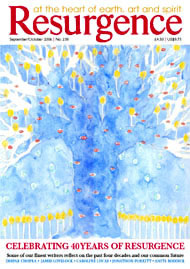WORKING WITH A “thimble for a kitchen” Wendy Cook and her team have given birth to a feast of a book. The Biodynamic Food and Cookbook contains an up-to-date critique of the modern fast-food industry and intensive farming, together with a call for a return to the dinner table and the leisurely enjoyment of cooking seasonal food with love. For Wendy the raison d’être of this cookbook is to draw attention to the importance of biodynamic agriculture as a worldwide movement involving many farmers with high moral integrity and a commitment to working with nature – in the broadest sense that encompasses the stars of heaven and the soils of earth.
There is an alchemical process at work in growing and in cooking. In both lies the potential for life-enhancing transformation that brings attunement and rejoicing to life, which could otherwise be left without vitality and meaning. Wendy’s wide knowledge provides an informative background to the reader, and her recipes will let you taste what she is getting at!
Rudolf Steiner, the inspiration behind the biodynamic farming movement, believed, like Wendy, that “if you don’t enjoy your food it will not do you a tremendous amount of good.” To this end Wendy does not shirk from using butter, wine, (unbleached) white flour and (brown) sugar in her recipes. She has lived through the 1970s wholefood era and does not wish her food to be stodgy and offputting.
Steiner, building on an old tradition of planting with a lunar calendar, gave advice about a totally new approach to agriculture and pointed out that the Earth needs healing. With this in mind he gave indications for special preparations that can be seen as homeopathic remedies for the earth. Wendy describes these preparations – horn manure preparation to be buried in winter when the earth is most open to receiving cosmic forces, and horn quartz or silica preparation which works to help the process of flowering, fruiting and maturation during the summer months. She also describes the stirring of the preparations as a community-building activity, as together friends and co-workers stir the preparation into a spiralling vortex that reflects whirling galaxies and planets orbiting the sun. Amazing abundance and fertility seem to result on land treated with these preparations – so much so that when Patrick Holden, Director of the Soil Association, helped launch Wendy’s cookbook at Schumacher College, he said emphatically that biodynamic farming was the next step beyond organic farming.
Wendy has herself gone far to applying Steiner’s ideas to the cooking process. Each menu should include all the elements ‘root, leaf, shoot and fruit’, since they reflect and feed different aspects of the human body. Many grains should be included and these may be seen as having some connection with the different planets in our solar system.
The Biodynamic Cookbook is not entirely a vegetarian cookbook. Though regarding vegetarianism as a force for the good, Wendy has written this book also with those ‘who are not yet there’ in mind, so mingling alongside Asparagus and Wild Garlic Tart and Nettle Oat Cream Soup you will find Janet’s Lavender Chicken and Pigeon Breasts in Blackcurrant Chocolate Sauce. Vegetarians should not be put off as the vegetarian recipes really are in the majority and vegetarian alternatives are clearly suggested for most of the fish, chicken and game dishes.
This book makes a valuable contribution to the local food/local life movement by following up its call for seasonal cooking with a description of the major religious festivals. These accounts usher in each seasonal selection of recipes, together with some of the most effervescent photography in a book brimming with beautiful images of healthy plants and smiling blackberry-juiced children. There really is so much here, from advice on how to stock your larder to what kind of saucepan to buy, that it is a veritable treasure. If it were your only cookbook, you would not go far wrong – and Wendy’s tone is so inclusive, wise and almost chummy that the text makes for a good read. You feel she has developed a real intimacy with her ingredients, and when she talks of a “good tempered pastry” I am drawn to think of her as a latterday Mrs Beeton.
Wendy’s Mallorcan inspiration leads me to compare her with Elizabeth David, who was also deeply influenced by Mediterranean cooking. But, as someone once said, “comparisons are odious.” Wendy and her book are unique, reflecting a unique, full life that spans a loving childhood in war-torn Britain, a splash into the world of showbiz with her then husband Peter Cook, and a journey towards wholeness with her two little girls, a Japanese macrobiotics teacher, and – of course – Rudolf Steiner.
Julia Ponsonby is a member of staff at Schumacher College and author of Gaia’s Kitchen.
QUOTE:
There is an alchemical process at work in growing and in cooking.






